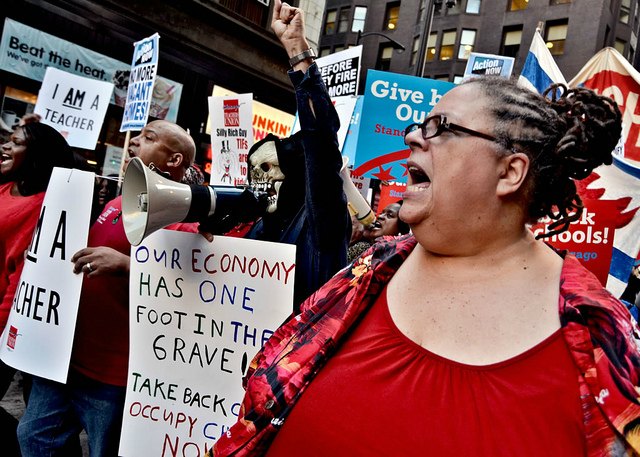CPS, CTU Set Stage For Possible Strike
By Chuck Sudo in News on Apr 17, 2012 7:00PM

CTU President Karen Lewis marches in October's "Take Back Chicago" protests. (Photo Credit: Tom Tian)
Chicago Public Schools and the Chicago Teachers Union have agreed to the appointment of a fact finding panel, the first of many steps that could lead to a strike by the teachers union later this year.
The three-person panel, consisting of CTU Vice-President and representative Jesse Sharkey, CPS representative Joseph Moriarty, and neutral Chairperson, Arbitrator Edwin H. Benn, will begin its work May 1 and will have 75 days to issue a report recommending terms of settlement of the current labor contract, which expires June 30.
Once the report is issued in mid-July, both sides have 15 days to either accept or reject the panel's recommendation. If one or both sides reject the report, the panel will make it available to the public, and the teachers union can call a strike after 30 days. All these steps are necessary under the education reform law signed by Gov. Pat Quinn last year, making it harder for teachers unions to call a strike.
The two sides remain far apart on a new contract, although they settled a dispute in late March over fair wages for teachers at schools that accepted CPS' implementation of a longer school day. CTU President Karen Lewis said last week internal polling showed support for a strike. Under the educational reform law, 75 percent of a union's membership must agree in order for a strike to be called.
Lewis said in a statement to media it isn't CTU's wish for a strike, but that CPS has created a "hostile climate" and that the union must be prepared for the possibility.
“It took 30 years for CTU to gain collective bargaining rights for our members,” Lewis continued. “These rights guarantee workers a fair contract with safe working conditions, a reasonable work day, adequate pay and some protections for our students. Teachers and education support personnel deserve the ability to protect their rights in the workplace and have a say in their job as educators.”